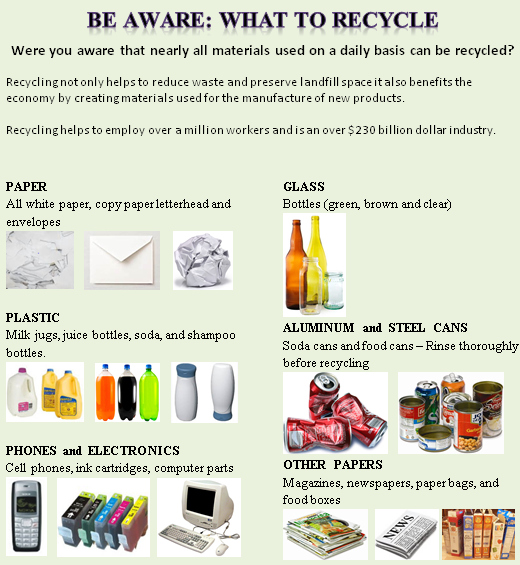One of the best ways to help sustain our environment is to participate in your local recycling program. Recycling helps to conserve the raw materials needed to produce new products and reduces the energy used in manufacturing. Recycling also helps to reduce the amount of trash in landfills and conserves natural resources.
Consider that the average person creates approximately 4 pounds of trash per day. That adds up to a staggering 1460 pounds per year per person. Using that math an average family of 4 would create 5840 pounds of trash per year! Most of the items discarded in the United States can be recycled. Aluminum cans, paper and plastic are the most commonly recycled items. What is not generally known is that there is so much more that can be reclaimed to help conserve raw materials. Nearly everything produced and consumed has an impact on our environment. It is up to us to change that impact for the better. All it takes is a willingness to change personal habits.
Here are some simple steps to help you get started with recycling:
- Make the commitment to participate. By reducing consumption and recycling as much as possible you will make a difference in the fight to sustain our environment for future generations.
- Learn about what recycling resources are available in your community. A good resource is your local government's web site or your local trash collector. They will have guidelines for what they can and cannot collect.
- Learn what can be recycled. You might be surprised at the number of things that can be recycled:
Acid Batteries Aluminum Cans Building Materials Cardboard Chemical Electronic Equipment Glass (bottles & jars) Lead Magazines Metal Newspapers Oil Paint Paper Plastic Bottles Steel Cans Tires White Goods (Appliances) Wood Writing/Copy Paper Yard Waste - Know what cannot be recycled:
Light Bulbs Drinking Glasses and Crockery Carbon Paper, Foil Wrapping Ceramics Gift Wrapping and Ribbon Aerosols Mirrors, Window Glass Waxed Coated or Lined Cartons Take-out Containers, Pizza Boxes Dead Animals Medical Waste Used Diapers - Find out what recycling programs or centers exist in your area. Visit earth911.com to search for places to recycle specific items.
- Create a system of collection in your home that works for your family. Recycling can take up space, so find a way to collect that does not interfere with the living area or create a danger in the home. Some simple solutions are to use tubs/bins in the garage or laundry room.
- Be considerate of trash collectors and wash food residue out of containers, bottles and cans before recycling. Do not place broke glass in the bins for recycling, and sort items correctly. Be sure to place your recycled items in the designated collection area.
- Be sure to purchase products that have been recycled like paper, clothing, insulation and countertops.
Armed with the knowledge of what steps to take, it's up to us to make the commitment to recycle. Only through informed choices can we as consumers change our impact on the environment. Only through thoughtful consumption and recycling can we help our economy and sustain our environment for future generations.
